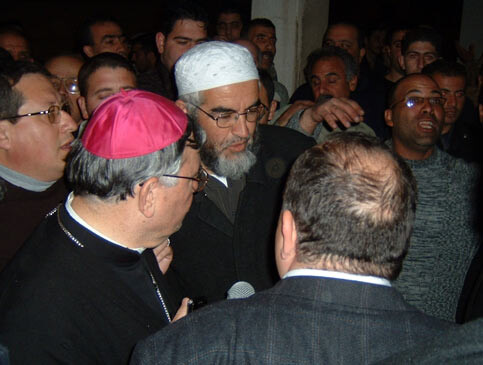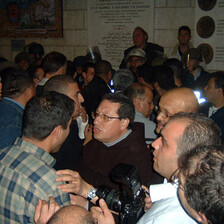I'lam - Media Center for Palestinians in Israel 21 April 2006

Also in this Briefing
Some weeks after the event was downplayed by the Israeli media, it was confirmed by police investigations that an attempt by an Israeli family to set off a large explosion in one of the Holy Land’s most sacred Christian sites, the Basilica of the Annunciation in Nazareth, had only narrowly been averted.

Sheikh Raed Salah, leader of the Islamic Movement in Israel, joins the Latin Patriarch Michel Sabbagh in a vigil outside the church. Christian and Muslim leaders were united in their condemnation of the attack, prompting much discomfort from the Israeli media and government ministers. (Jonathan Cook)
On 3 March, Haim Habibi, aged 43, his wife Violet, aged 39, and their 20-year-old daughter, Odelia, brought a small arsenal of explosives hidden in a pushchair to the Basilica, the site where Christians believe two millennia ago the Archangel Gabriel revealed to Mary that she was bearing the son of God.
Church officials wrestled control of the explosives from Habibi after he let off several sound bombs inside the building during a service for Lent. The family were locked inside an annex room of the church for their own safety as local inhabitants came to see what had caused all the noise.
A stand-off developed for several hours in the courtyard of the church between Israeli security forces and thousands of local residents, before Israeli police smuggled the family out of the annex disguised as police officers.
Following early Israeli media reports dismissing the story - the family were said to have been “crazy” and merely thrown “firecrackers” - the attack received almost no coverage. Inside Israel the incident was portrayed as a sad story of one desperate family’s cry for help.
However, evidence from subsequent court hearings and police investigations has painted a very different picture of what the Habibis intended. They had come well prepared for a large attack and had chosen as their first target not the Basilica but the city’s biggest mosque.
The Habibis were seen walking around the ancient White Mosque in Nazareth’s old market earlier but when they found it empty moved on to the church. According to the Yedioth Aharanoth newspaper, they arrived there with dozens of sound bombs, firework rockets and flares, gas canisters, and bottles of turpentine and petrol.
An investigation by the Arab Human Rights Association(HRA) in Nazareth has also revealed that the pushchair was crammed with marbles, presumably in the hope that in an explosion many more worshippers would be killed and injured by the projectiles.
After entering the church, the couple took up position in one corner while their daughter, Odelia, poured petrol on and around them. They then let off the sound bombs to terrify the congregation inside. When a church official tried to approach them, they doused him too in petrol and tried to set him on fire. According to several witnesses, Haim Habibi tried to detonate the gas canisters before he was overpowered.
In court it emerged that the Habibis, from Jerusalem, had staged the attack after their young son had been taken into care, and then handed over to foster parents in a West Bank settlement.
The three were charged with arson, unruly behaviour and attempted vandalism. Odelia was subsequently released to house arrest.
Arab community leaders said they believed the mosque and church had been selected by the Habibis for the attack because of frequent incitement against the country’s large Arab population by Israeli politicians, security officials and rabbis. Arab citizens’ loyalty to the state is regularly called into question, and the community is regularly referred to as a “timebomb” because of its higher birth rates, which are seen as threatening the Jewishness of the state.
In August last year a soldier, Eden Natan Zada, tried to foil the disengagement from Gaza by spraying bullets into a bus in the Arab town of Shafa’amr, killing the driver and three passengers. Natan Zada was dismissed as “crazy” by the Israeli media too, as was Eliran Golan, a member of the Jewish underground in Haifa, who mounted a wave of terror attacks against Arab citizens over three years between 2001 and 2004.
Arab community leaders, including those drawn from the Muslim and Christian sects, staged a joint protest march through Nazareth the day after the attack calling for an end to official incitement against the Arab population.
At a cabinet meeting the next day, the acting Prime Minister, Ehud Olmert, tried to make political capital out of the Arab community’s show of solidarity - and to incite further against the Muslim population. He told other ministers: “There is something almost ludicrous about the heads of the Muslim community, which is not noted for displays of tolerance toward Christianity, marching at the head of a protest over an incident caused by an eccentric couple.”
By Monday 6 March, three days after the attack, Israeli reporters were called to the police station where the Habibis were being held. At a hastily convened press conference an official for the Vatican, Pierbattista Pizzaballa, publicly forgave the family for their attack on the Basilica.
A police spokeswoman, Aliza Azoulay, said the Israeli police “wanted to calm tensions and show that this was not a terrorist act, but an act of personal distress”. Apparently the police were not concerned that, in organising the press conference, they had directly interfered in a legal case before the courts.
The Vatican official, Pizzaballa, who is responsible for church property and not for spiritual matters, had no authority to grant forgiveness to the Habibis, as was later confirmed by more senior church officials.
However, the press conference may have been useful to both sides. Israel wants a veil drawn over the matter as quickly as possible, and the Vatican has been seeking to restore good relations with Israel for some time. Israel has been threatening to penalise the international churches who own property in Israel with land taxes and many Catholic priests and nuns have also been facing the loss of their work permits, making it impossible for them to live in the Holy Land.
A senior Catholic leader, Bishop Giacinto-Boulos Marcuzzo rejected the argument that the Habibis were simply crazy put forward by the police and Olmert. “Crazy people don’t behave this way,” the bishop said. “They came especially from Jerusalem, they bought all this equipment, they brought the baby stroller, and they waited for the right moment when the Church would be full.”
I’lam Media Center for Arab Palestinians in Israel is a non-profit organization based in Nazareth. It was founded in 2000, by a group of Arab journalists and academics. As the only Arab Palestinian media organization in Israel, I’lam is deeply committed to the democratization of media policies, media practices, and the media landscape in Israel.
Related Links:


